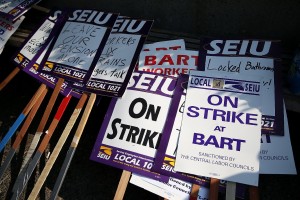ADLER: Yes, exactly. It's all by state law, and California's law is different. It doesn't have the same kind of punitive aspects, and in fact strikes are legal in California.
JOHNSON: Now they are legal here, but are they worth it in the long run? They're a major inconvenience for the public. Is the hassle effective in getting workers what they want, when all else fails?
ADLER: I think that the strike activity that you described at the beginning of this interview is reflective of the fact that the unions feel that they need to go on strike irrespective, in certain circumstances, of the outcomes because the attack has been so significant, and the challenge to their leadership and to their membership has been pervasive and constant. You in California, your Legislature cut back on some pensions legislatively last year. You had citywide votes in San Jose and San Diego that have also trimmed police officers' pensions -- of all people, police officers. And at some point unions just draw the line and say, "I'm not moving backwards."
JOHNSON: Based on your studies of strikes and labor disputes, what lessons can we learn for how to keep these sparks from just catching fire? How do we resolve this quickly and hopefully avoid future strikes?
ADLER: One thing that would have to be done would be that the negotiators for the public agencies, or the public employers, would certainly have to move fully away -- dissociate themselves -- from any kind of demonization of public workers at this time in history. Secondly, they'd have to acknowledge the incredible amount of productivity. If you stop to think about this -- 2,300 or so workers are moving 400,000 people daily. That's an extraordinary productivity ratio in terms of things happening. Thirdly, I think there has to be really realistic exchanges, where people have really principled exchanges at the bargaining table and otherwise in order to essentially build trust. Because you look at all the newspaper stories. Every one of them suggests, "Oh, well, the union walked away," or "Oh, well, management didn't really offer something." You know, there are all these factual concerns or disagreements about whether there was a sincere offer -- the management put out an offer -- they doubled their offer. But then when you look at the details of that offer, it's contingent on so many different things that they didn't really double their offer. So this negotiation is punctuated by difficulty with sincerity. And when you have difficulty with sincerity, you have difficulty with trust. And when you have difficulty with trust, you've got a situation like you folks in the Bay Area have today.
JOHNSON: And your one best piece of advice to the unions in terms of how to get on with the strike being done and get back to business?
ADLER: I think that if they can get what they can in as quick a fashion as possible, that maintains integrity in their workforce and makes the women and men feel as if they have at least righted the ship of BART, or Bay Area transit workers, with regard to pension and health care. And get back to work, sooner rather than later, after they've gained a bit here and a bit there because it's tough to win a long strike like this.
JOHNSON: Lee Adler teaches at Cornell University's School of Industrial and Labor Relations. He also provides legal counsel for firefighter unions around New York State. Lee, I appreciate the insights, thanks for talking to us.
ADLER: You're welcome, sir. Best of luck to your community on getting things square.
Listen to the interview:
